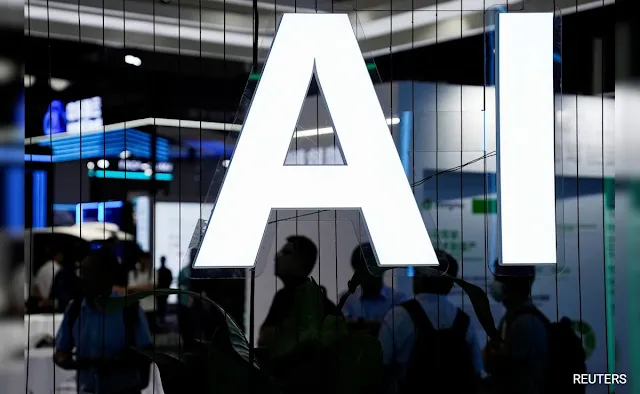China's AI Innovation Marches On Through US Obstacles and Sanctions
 |
| The conference has also served as a launchpad for companies to introduce their latest AI products. |
Despite US export controls on key technologies, Chinese tech companies showcase over 150 cutting-edge AI innovations at the Shanghai World AI Conference.
This week China defiantly showcased its growing artificial intelligence capabilities, even as US sanctions threaten to limit its progress. Executives remain optimistic that cloud computing can enable breakthroughs.
Chinese AI Innovation Powers Ahead Despite US Sanctions
China's artificial intelligence sector shows no signs of slowing down. This week at the World AI Conference in Shanghai, Chinese tech firms proudly showcased over 150 AI innovations, from cutting-edge large language models to real-world applications like self-driving cars.
A Display of Technological Prowess
The vibrant exhibit was a defiant answer to the US sanctions that threaten to hinder China's AI progress. Executives expressed strong faith that homegrown innovation, especially in cloud computing, will allow China to advance its AI leadership goals.
"We must have our own independently developed and controlled LLMs," said Iflytek chairman Liu Qingfeng.
By partnering clever software with accessible hardware, Chinese companies aim to stand shoulder-to-shoulder with AI pioneers like OpenAI.
The conference also saw bold product launches, like SenseTime's SenseNova 5.5. Touted as a rival for OpenAI's GPT-4, it can solve math word problems - a task long considered difficult for AI.
The Albatross of US Export Controls
In recent years, the US added dozens of Chinese tech firms to trade blacklists over data privacy concerns. Huawei, SenseTime, Iflytek and others can no longer buy advanced AI chips from American manufacturers.
"If we believe that not having the most advanced AI chips means we will be unable to lead in AI, then we need to abandon this viewpoint," said Huawei executive Zhang Ping'an.
Clever workarounds may mitigate the chip shortage, but creativity has limits. Chinese companies are pushing for self-reliance in semiconductor technology, but replicating state-of-the-art fabrication labs will take years and massive investment.
In the meantime, China is boosting its formidable talent pool of AI researchers and developers. The vibrant startup scene produces exciting new models every year. Government initiatives like the New Generation AI Development Plan are accelerating progress.
Still, the damage from US blacklisting runs deep in terms of slowing development and restricting access to sorely-needed computing power.
Cloud Computing to the Rescue
With advanced hardware out of reach for now, Chinese firms are pinning their hopes on cloud-based software innovation. By tapping abundant, affordable cloud servers, developers can craft sophisticated algorithms to power breakthrough applications.
"Without applications, having only foundational models, whether open-source or closed-source, is worthless," warned Baidu CEO Robin Li.
Instead of playing "catch-up" with programs like OpenAI's ChatGPT conversational bot, China aims to lead in commercializing AI. Chinese tech giants like Alibaba and Tencent pour billions into cloud services to enable this transformation.
The nation also boasts the world's largest population of internet users - a valuable trove of consumer data to refine retail, healthcare and other AI tools.
Brave New Frontiers
The US-China technology standoff shows no signs of thawing. But geopolitical headwinds won't deter China's march to AI supremacy.
This week's showcase in Shanghai was both a swaggering advertisement and a promise of more fireworks to come. SenseTime and Iflytek are hard at work on homegrown LLMs to rival ChatGPT. Hundreds more startups are pushing the boundaries in fields like quantum machine learning and augmented reality.
Meanwhile, Chinese consumers stand to benefit enormously from AI creeping into every facet of life. Planning a vacation? AI travel agents have you covered. Want a late-night snack? AI-scheduled buses and self-driving delivery vans make it happen seamlessly.
The march of progress continues, sanctions be damned. China's formidable tech sector thrives on adversity - and the whole world will reap the rewards.
China's tech sector thrives on adversity. Though geopolitics buffet its AI ambitions, vibrant homegrown innovation ensures progress continues - and the whole world benefits.




%20a%20line%20gra.webp)


0 Comments